Peg Duthie's Blog, page 49
September 5, 2013
Shelley Jackson Denham, 1950-2013
Last summer, when I went to the Highlands-Cashiers Chamber Music Festival in North Carolina, I was captivated by the beautiful woman turning pages for William Ransom. She had silver hair and wide eyes and she was so engaged with the music -- not histrionically or showtastically or in any way in the way of the performance, yet vibrantly, fully present.
I was introduced to her at a reception after the concert, but with our first names only, so several minutes went by before the clues added up and I realized I was talking to a woman whose hymns I'd sung many times. At which point I fear I went into stammering fangirl mode, but she handled that graciously, of course.
Last night -- at the end of chamber choir rehearsal -- I learned that Shelley's husband had passed away in May, and that she died on Sunday of a heart attack.
I have Singing the Living Tradition open at the moment to #86:
 comments
comments
I was introduced to her at a reception after the concert, but with our first names only, so several minutes went by before the clues added up and I realized I was talking to a woman whose hymns I'd sung many times. At which point I fear I went into stammering fangirl mode, but she handled that graciously, of course.
Last night -- at the end of chamber choir rehearsal -- I learned that Shelley's husband had passed away in May, and that she died on Sunday of a heart attack.
I have Singing the Living Tradition open at the moment to #86:
Spirit of great mystery,
hear the still, small voice in me.
Help me live my wordless creed
as I comfort those in need.
Fill me with compassion,
be the source of my intuition.
Then, when life is done for me,
let love be my legacy.
--Shelley Jackson Denham, 1987
 comments
comments
Published on September 05, 2013 09:59
September 4, 2013
"It's on time if it gets there"
The subject line is from William Stafford's Putting the Sonnet to Work (written about eight months before he died). It is unsettling...
Decal seen on the front of a lawn mower in Jerusalem, on the Givat Ram campus of Hebrew University, October 2009:
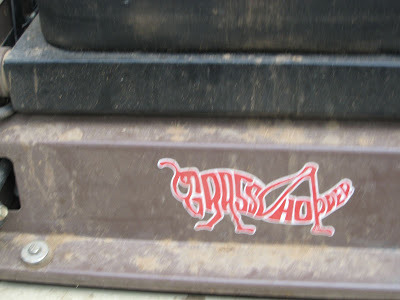 From Israel 2009 - set 3
From Israel 2009 - set 3
 From Israel 2009 - set 3
From Israel 2009 - set 3
From another Stafford poem, written about three months before he died:
There are many lions in Jerusalem:
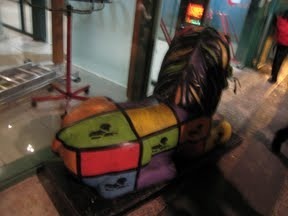 From Israel 2009 - set 3
From Israel 2009 - set 3
 From Israel 2009 - set 2
From Israel 2009 - set 2
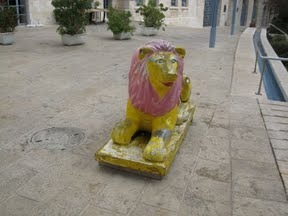 From Israel 2009 - set 2
From Israel 2009 - set 2
 comments
comments
Decal seen on the front of a lawn mower in Jerusalem, on the Givat Ram campus of Hebrew University, October 2009:
 From Israel 2009 - set 3
From Israel 2009 - set 3
 From Israel 2009 - set 3
From Israel 2009 - set 3From another Stafford poem, written about three months before he died:
It's heavy to drag, this big sack of what
you should have done. And finally
you can't lift it any more.
Someone says, "Come on," and you
just look at them. Trees are waiting,
mountains. You never intended
that it should come to this.
But Now has arrived and is looking
straight at you, the way a lion does
when thinking it over . . .
There are many lions in Jerusalem:
 From Israel 2009 - set 3
From Israel 2009 - set 3
 From Israel 2009 - set 2
From Israel 2009 - set 2
 From Israel 2009 - set 2
From Israel 2009 - set 2 comments
comments
Published on September 04, 2013 09:01
September 3, 2013
adventures in Greek cooking
Lui, peering at the stew: Why is it hairy?
Moi: I think it's the anchovies.
 comments
comments
Moi: I think it's the anchovies.
 comments
comments
Published on September 03, 2013 18:12
September 2, 2013
another definition of "light"
It took some searching, but I have now learned that "light" is a UK term for "lung." During earlier dips into Patience Gray's Honey from a Weed, I hadn't noticed the recipe for "splína ke kokorétsi katsikíou: grilled goat's lights" (which Nigel Slater uses as as a springboard for a paean to offal in general. Gray's recipe also mentions "lamb's pluck," which Elizabeth Minchilli explains comprises the heart, lungs, and liver. Izzy Cohen states that "lights" meant "lungs" in Old English (as "the least dense body part") and that the phrase "I'm going to beat the living daylights out of you" alludes to the speaker wanting to pummel the liver (the most dense body part) and lights out of the target. Ah, language.
Some other day, when I'm feeling more playful, I shall riff on the line "above all lights must be fresh" from Gray's recipe, and also on typing "heart" when I meant "hear" in a message (e.g., the blur of intensity between "I heart you" and "I hear you").
Reading these recipes about sweetbreads is also putting me in the mood to cook them, but what I actually have on hand are pork loins that need to be cooked today, and onions from the quick-sale rack, along with a manuscript keeping me at home (which is fine, since I went to cookouts the past two nights). I am going to attempt a variation on Susanna Hoffman's recipe in Olive and Capers for pork stew, which includes olives, anchovies, red wine, and white beans.
This weekend's hit from my kitchen was brownies (Duncan Hines mix spiked with candied orange peel, allspice, and pecans). At yesterday's gathering, someone brought a fluffy feta-garlic dip that may redefine my relationship with feta (I don't usually go out of my way for feta, but this was goooood). This week's deadlines preclude me getting caught up in anything ambitious, but last Thursday a friend handed to me her copies of four Elizabeth David books. There will be dreaming. :-)
 comments
comments
Some other day, when I'm feeling more playful, I shall riff on the line "above all lights must be fresh" from Gray's recipe, and also on typing "heart" when I meant "hear" in a message (e.g., the blur of intensity between "I heart you" and "I hear you").
Reading these recipes about sweetbreads is also putting me in the mood to cook them, but what I actually have on hand are pork loins that need to be cooked today, and onions from the quick-sale rack, along with a manuscript keeping me at home (which is fine, since I went to cookouts the past two nights). I am going to attempt a variation on Susanna Hoffman's recipe in Olive and Capers for pork stew, which includes olives, anchovies, red wine, and white beans.
This weekend's hit from my kitchen was brownies (Duncan Hines mix spiked with candied orange peel, allspice, and pecans). At yesterday's gathering, someone brought a fluffy feta-garlic dip that may redefine my relationship with feta (I don't usually go out of my way for feta, but this was goooood). This week's deadlines preclude me getting caught up in anything ambitious, but last Thursday a friend handed to me her copies of four Elizabeth David books. There will be dreaming. :-)
 comments
comments
Published on September 02, 2013 12:13
September 1, 2013
"September has come and I wake / And I think with joy . . ."
". . .and all of London littered with remembered kisses."

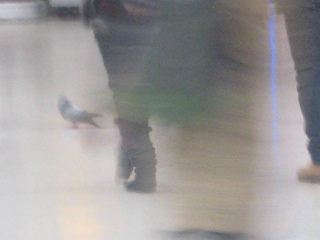
["...You whom I remember glad or tired,
Smiling in drink or scintillating anger,
Inopportunely desired
On boats, on trains, on roads when walking.
Sometimes untidy, often elegant..."]

[Snapshots from London, November 2011. Quotations from Louis MacNeice, Autumn Journal (the link is to a NYT review of his Collected Poems)]
 comments
comments


["...You whom I remember glad or tired,
Smiling in drink or scintillating anger,
Inopportunely desired
On boats, on trains, on roads when walking.
Sometimes untidy, often elegant..."]

[Snapshots from London, November 2011. Quotations from Louis MacNeice, Autumn Journal (the link is to a NYT review of his Collected Poems)]
 comments
comments
Published on September 01, 2013 12:30
August 31, 2013
snippets
David Orr is given to pronouncements about the professional poetry scene and its foibles. Reading them is a guilty pleasure for me. From 2007:
And from this past Sunday:
Like Mary, I have been going through some of my old files. Here's an SASE from 2001 where the postmark action amused me:
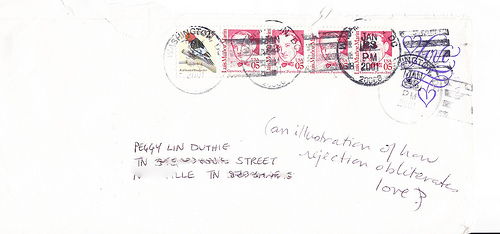
And here are some stamps from 2004, when I was thinking of submitting more frequently to Canadian markets. I shall use them on letters later this year...
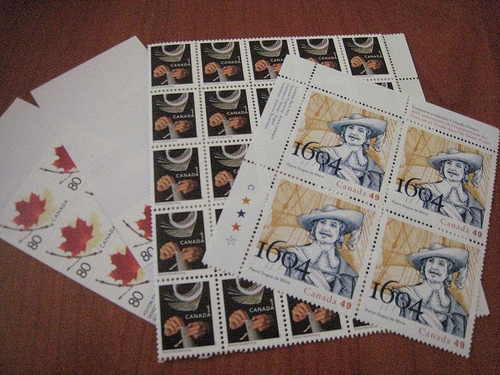
 comments
comments
The history of American poetry, like the history of America itself, is a story of ingenuity, sacrifice, hard work and sticking it to people when they least expect it. Whether it’s Ezra Pound dismissing his benefactor Amy Lowell as a "hippopoetess" or Yvor Winters accusing his friend Hart Crane of possessing flaws akin to a "public catastrophe," you can count on the occasional bushwhacking in the land of what Horace called "the touchy tribe."
And from this past Sunday:
The audience for poetry is like a vastly reduced version of the audience for college football — superstitious, gossipy and divided into factions no less fervent for having only an occasional idea of what’s going on outside their own campuses. It’s a hard crowd to write for, and the critic who sets himself up as a color commentator inevitably struggles to find a style that can please Peter without needlessly riling up Paul.
Like Mary, I have been going through some of my old files. Here's an SASE from 2001 where the postmark action amused me:

And here are some stamps from 2004, when I was thinking of submitting more frequently to Canadian markets. I shall use them on letters later this year...

 comments
comments
Published on August 31, 2013 11:01
August 30, 2013
"There had been troubles, sure..."
...everyone has some. But now, looking out there,
she felt easy, at home in the world -- maybe like
a casual snowflake. And some people loved her.
She would remember that. And remember this place.
As you will, wherever you go after this day,
just a stop by the road, and a glimpse of someone's life,
and your own, too, how you can look out any time,
just being a part of things, getting used to being a person,
taking it easy, you know.
-- William Stafford, "Emily, This Place, and You," in The Way It Is
Snapshots of the audience at a Charanga Carolina concert one year ago:
( Read more... )
 comments
comments
Published on August 30, 2013 06:47
August 27, 2013
Eilat, November 2009
The New York Times posted an article today (to be run in tomorrow's print edition) titled "At Israeli Resort Town, Ignoring the Strife to Soak Up the Sea," by Isabel Kershner. I took a bus from Jerusalem to Eilat back in 2009:
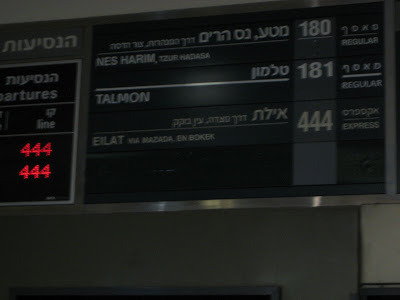 From Israel 2009 - set 4
From Israel 2009 - set 4
( Read more... )
 comments
comments
 From Israel 2009 - set 4
From Israel 2009 - set 4( Read more... )
 comments
comments
Published on August 27, 2013 20:23
August 26, 2013
thrilling and specious
I SHOT A MAN IN CORLEONE How Sicily Explained Johnny Cash ...
David Kirby, in the Fall 2006 issue of Shenandoah:
 comments
comments
David Kirby, in the Fall 2006 issue of Shenandoah:
I've always had trouble understanding how the Folsom audience could get away with that anarchic "Yeahhhh!" It turns out that they didn't. In Johnny Cash at Folsom Prison, his note-for-note reconstruction of Cash's historical January 13, 1968 Folsom prison concert, Michael Streissguth reports that the inmates listened silently, enthralled by the look and music of the "black circuit rider" who had appeared before them, yelling clamorously only as the song ended. The version the rest of us hear was pumped up by Columbia Records sound engineers who moved audience noise around to create a moment of musical fiction as thrilling as it is specious.
 comments
comments
Published on August 26, 2013 12:34
August 25, 2013
"welcome" sometimes means "thank you"
 From Israel 2009 - set 3
From Israel 2009 - set 3Seen in Jerusalem, November 2009. (I'm revisiting my old albums as I work on a Tel Aviv-related project.)
 comments
comments
Published on August 25, 2013 14:33



